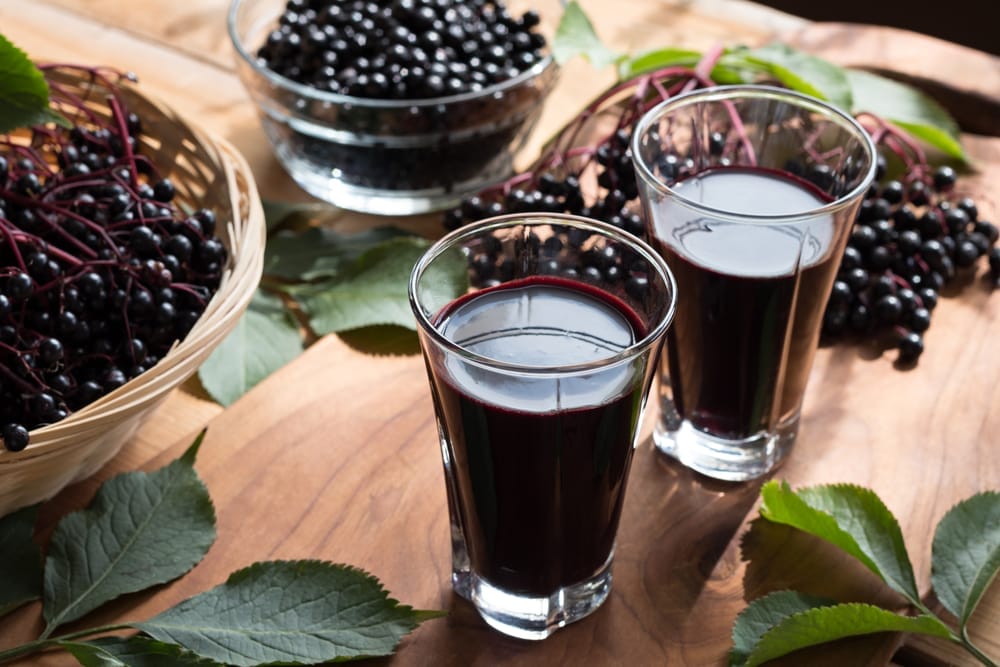We are increasingly looking for effective natural ways to boost immunity and maintain good health. One of the most effective vitality elixirs commonly used by our grandmothers and great-grandmothers is elderberry. It is a reliable support for colds, lack of vitality and high susceptibility to infection. The high accumulation of active substances in elderberries, including anthocyanins and flavonoids, makes them a true rarity in the field of natural medicine.
Table of contents
- 1 Black elderberry – small berries with great potential
- 2 Black elderberry – composition of the plant
- 3 Elderberry – medicinal properties and uses
- 4 Elderberry for immunity
- 5 Elderberry for infections
- 6 Elderberry flowers – health-promoting effects
- 7 When to collect elderberry flowers?
- 8 When to pick elderberries?
- 9 How to make elderberry juice?
- 10 How to make elderberry syrup?
- 11 Elderberry – dosage and contraindications to use.
- 12 Elderberry – use in cosmetics
- 13 Is elderberry poisonous?
Black elderberry – small berries with great potential
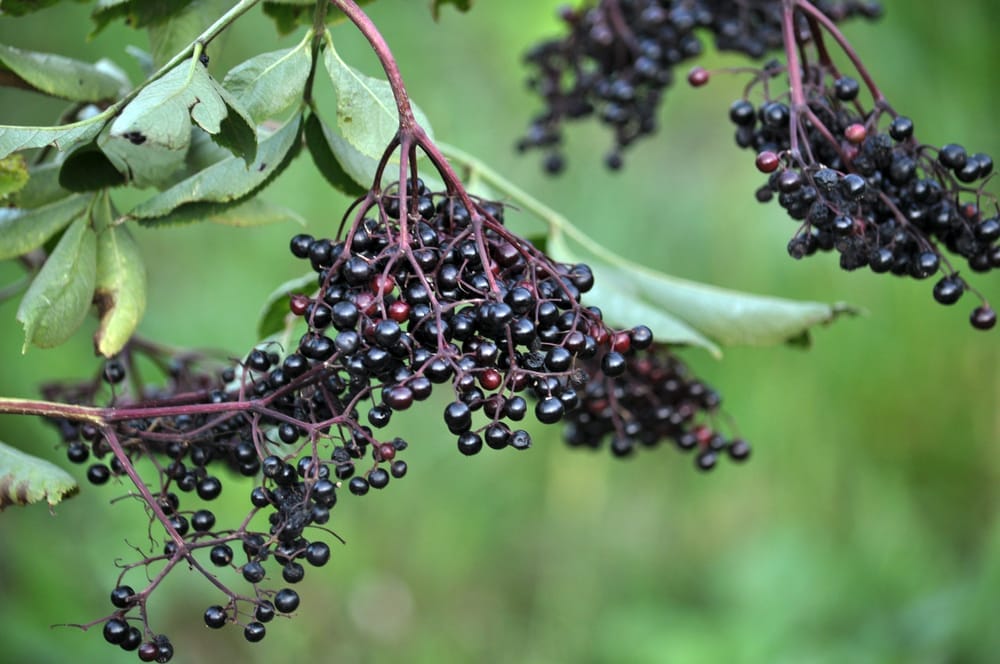
Black elder berry is a plant whose medicinal properties have been appreciated for many generations. It was already known in ancient times. Among other things, it was used as a laxative and diuretic. It also worked well for cosmetic purposes, including hair coloring. Our grandmothers appreciated the extraordinary power of these dark purple berries, so they occupied one of the leading places in the arsenal of home remedies, right next to such raw materials as coltsfoot, honey and rosehip.
Used in folk medicine, elderberry is undergoing a renaissance today. It is increasingly found on sale in the form of juices, syrups and dietary supplements. It is an effective remedy for immunity and helps fight a whole range of ailments. Black elderberry, however, has more benefits. It is appreciated not only for its health benefits, but also for its decorative and cosmetic qualities.
Black elderberry, or Sambucus nigra, is also known by many other regional names, such as lilac, elderberry, hickory, holly, wild elderberry, apothecary elderberry, and elderberry. The plant belongs to the muskmelon family. It has the form of a shrub or small tree. It has large, dark green leaves and white flowers gathered in inflorescences in the form of umbels. The fruits are small spherical berries of dark red, dark purple or black color.
Black elderberry is found in many parts of the globe, including throughout Europe, Asia Minor and some areas of Africa. It can be found on the edges of forests, along roads, on spits, debris, wastelands, in forest clearings and around houses. Because of its aesthetic value, elderberry trees and shrubs also appear in parks and gardens.
Elderberry flowers and fruits are a medicinal resource. Both flowers and fruits are a source of many valuable substances for the human body, but it is the fruit that enjoys greater recognition and more frequent use. In addition to vitamins, mineral salts, organic acids or tannins, they contain large amounts of valuable for health pigments such as anthocyanins.
Black elderberry – composition of the plant
In the age of advanced medicine, it is not uncommon for us to return to our roots as well, discovering that traditional treatments using plant components are highly effective. The effectiveness of many natural raw materials, moreover, is confirmed by the results of scientific studies. Elderberry is one such noteworthy plant ingredient that can support the body in many ways.
Its fruits are a rich source of health-supporting substances. Quercetin and rutin, present in elderberry fruits, are powerful antioxidants that protect cells from free radicals. Also, the vitamin C present in elderberry fruits strengthens immunity, and anthocyanins show anti-cancer properties and benefit the heart. This is just the beginning of the list of riches contained in elderberry fruits.
Active substances present in elderberry fruit:
- flavonoids,
- anthocyanins,
- pectin,
- tannins,
- organic acids,
- amino acids,
- glycosides,
- triterpenes,
- vitamin C,
- vitamin A,
- B vitamins,
- minerals (potassium, calcium, phosphorus, zinc, magnesium, copper, manganese).
Elderberry – medicinal properties and uses
Elderberry fruit is a multi-purpose plant weapon against health ailments and skin deficiencies. It exhibits good diaphoretic and diuretic properties, making it an effective way to eliminate toxins and harmful metabolic products from the body. A cleansed body is essential if you want to ensure better immunity, efficient metabolism and normalized body weight.
Elderberry fruit is also a valuable support for our cardiovascular, respiratory and urinary systems. Thanks to pectin, elderberry fruit regulates digestive processes, and thanks to its vitamin and mineral salt content, elderberry takes care of bone health, supports water-electrolyte balance and revitalizes the body.
Health-promoting properties of elderberry fruit:
- exhibits antibacterial and antiviral activity,
- supports the treatment of infections of various types, including upper respiratory tract infections,
- improves the work of the immune system, has a strengthening effect,
- has expectorant properties, helps with coughs, runny nos es and sinusitis,
- helps to get rid of fever thanks to its diaphoretic properties,
- has a positive effect on eyesight,
- has strong anti-inflammatory properties,
- helps fight joint pain and headaches, relieves symptoms of sciatica,
- improves intestinal peristalsis, regulates digestive processes, is helpful for flatulence, indigestion, constipation, as well as diarrhea and abdominal pain,
- has anti-allergic properties,
- regulates glucose-insulin metabolism, helps lower blood sugar levels,
- has excellent antioxidant properties (exhibits the ability to bind free radicals, thereby protecting cells from damage and inhibiting the aging process),
- supports the cardiovascular system, strengthens and makes blood vessels more flexible, supports the heart, helps normalize blood pressure and cholesterol levels.
Elderberry for immunity
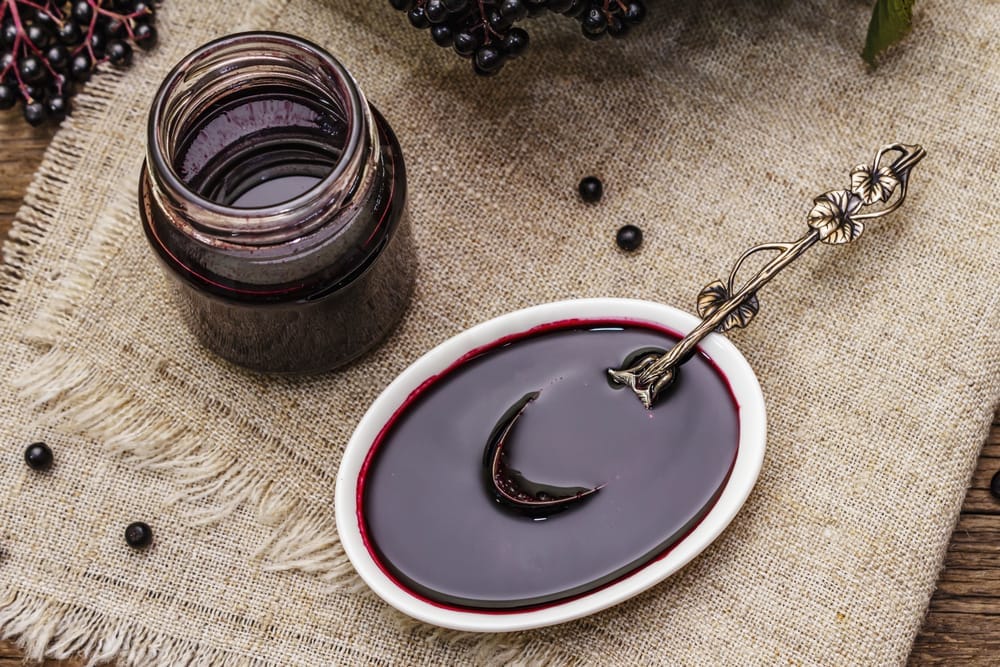
Elderberry is an indispensable ally for building immunity. In its composition you will find a whole range of active substances that strengthen the body’s natural defensive barriers against all unfavorable factors.
Among the compounds present in elderberry that support immunity, it is worth mentioning, for example, quercetin, rutin, vitamin C, anthocyanins, phytosterols, phenolic acids, B vitamins. Thanks to them, elderberry accelerates the extinction of inflammation, stimulates the production of immune cells and improves the process of capturing and neutralizing pathogens. Elderberry also has a high antioxidant potential. By boosting the immune response, it reduces our susceptibility to disease.
Elderberry extracts can be found in numerous medicines and dietary supplements for immunity. One of the most elaborate in terms of formulation for improving immunity with elderberry is NuviaLab Immune. In addition to the extract of this plant, the supplement also contains a number of other effective ingredients to support the immune system.
Elderberry for infections
By adding elderberry juice or other elderberry-based specifics to the diet, we provide the body with a number of valuable substances that support the fight against infections and improve immune function. The plant will prove useful both when we intend to strengthen the body prophylactically and reduce the tendency to catch colds, and when we are just going through an infection. As tests have shown, the use of elderberry in the right doses makes the time of illness shorten by 3-4 days.
Elderberries effectively strengthen the body’s ability to repel attacks by pathogenic microorganisms, including viruses and bacteria. Absolutely, elderberries in the form of juice, syrup or dietary supplements are one of the best natural remedies for patients with flu-like symptoms and for those who want to strengthen immunity.
In case of infection, elderberry fruit has a multifaceted effect: it dilutes secretions and facilitates egg expectoration, helps eliminate a runny nose, has an antipyretic and anti-inflammatory effect, relieves headachesheadaches, reduces the growth of bacteria and viruses, seals blood vessels, protects the mucous membranes of the upper respiratory tract.
Elderberry flowers – health-promoting effects
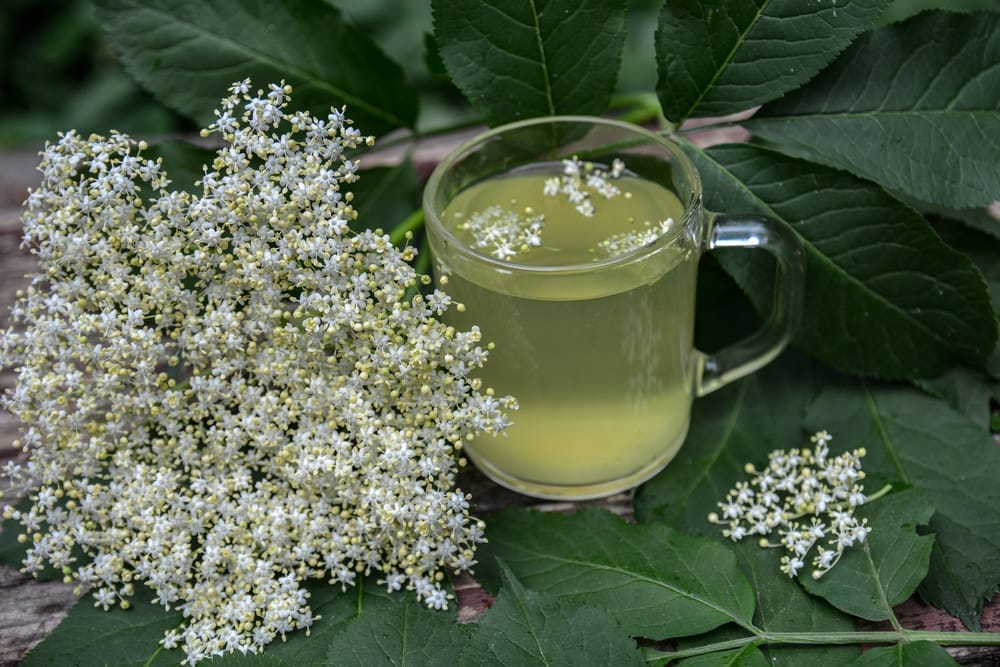
Although elderberry flowers are not as popular and frequently used as elderberries, they too exhibit a number of valuable health properties. Among their beneficial actions are worth mentioning:
- antimicrobial and antiseptic activity,
- leveling inflammation,
- positive effect on the circulatory system, sealing the walls of blood vessels,
- supporting the respiratory system, helping with runny noses, coughs and infections of the mouth, throat, larynx,
- antioxidant protection,
- assistance in stabilizing blood pressure,
- diaphoretic, diuretic and detoxifying effects.
Elderberry flowers can be purchased in the form of ready-made dried herbs or collected and dried by hand. An infusion of elderberry flowers is prepared in a trivial way:
Pour about 4-5 g of elderberry flowers (1 tablespoon) over 1 cup of boiling water. Steep for 10 minutes covered. Strain. Drink 2-3 times a day.
When to collect elderberry flowers?
Elderberry flowers are collected in the early stage of flowering, that is, in May and June. Collected flowers should be separated from the stalks, spread on paper, cotton cloth or tray and dried in a dry, airy place.
When to pick elderberries?
While in the case of flowers the stage of flowering determines when to harvest them, in the case of fruits the degree of ripeness is crucial. Only heavily ripe fruits should be harvested, when they are almost black, soft, ripe and shiny. The optimal harvest time is late September and early October.
How to make elderberry juice?
Prepare the following: 1 kg of ripe elderberries, 1 lemon, 1 liter of water, 1 cup of sugar.
Wash the fruits and separate them from the stalks and leaves. We put them in a pot and pour water over them. We add sugar and lemon juice. We cook for about an hour on low heat. From time to time we stir and slightly crush the fruit. Strain through a strainer. We cool the poured juice and hide it in the refrigerator.
How to make elderberry syrup?
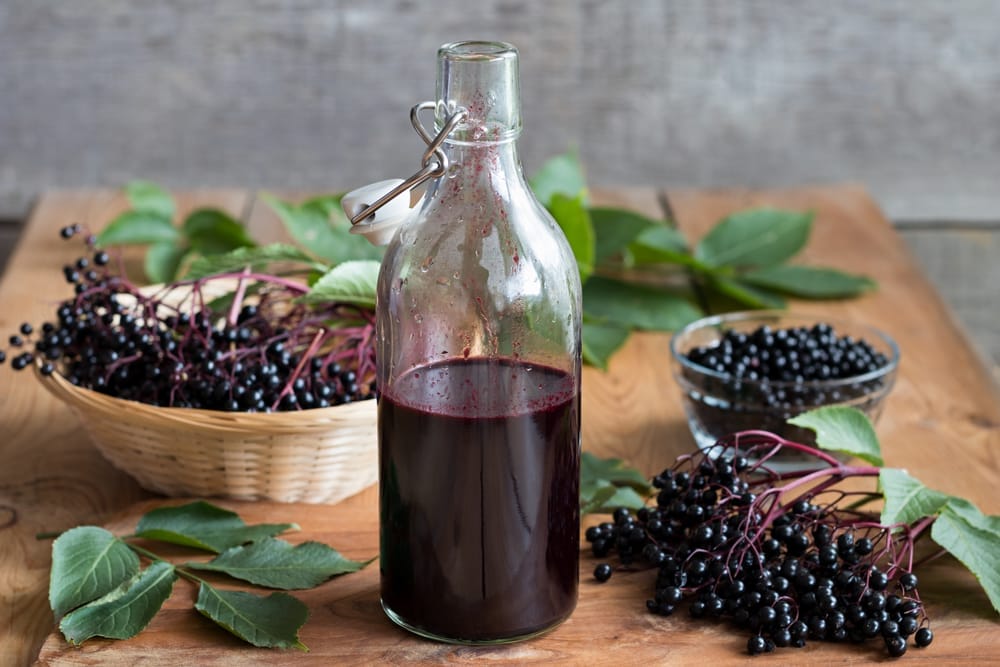
The ingredients needed for elderberry syrup are: 800 g of elderberries, 400 g of sugar, 700 ml of water.
After cleaning the fruits, we put them in a pot and pour water over them. We boil for 30 minutes. We cool and separate the pulp from the juice. We heat the juice, add sugar, stir thoroughly. We cook a few more minutes on low heat. After cooling, we pour into jars. We carefully cap and pasteurize. We can skip pasteurization, but then keep the syrup in the refrigerator (for a short period).
Elderberry – dosage and contraindications to use.
Elderberry fruits can be consumed in various forms. They are made into preserves – juices, syrups, jams, and can also be taken in the form of dietary supplements. Elderberry flowers can be used to make herbal infusions.
The recommended daily dose of elderberries is 50 to 100 grams, which is equivalent to about 15-25 ml of elderberry syrup or juice. It should be remembered that elderberries are consumed only in the form of preparations, never raw.
For dried elderberry flowers, the recommended daily dose is 5-15 grams.
For elderberry extracts, the recommended dose is 100 to 300 mg of extract per day, but it is always worth adjusting the dose according to the manufacturer’s recommendations.
Elderberry – use in cosmetics
In years past, elderberry found a place in many home first-aid kits, providing a universal remedy for everyday health ailments and weakening of the body. Today it is also moving into the world of skin care.
Elderberry extracts can increasingly be found in the composition of creams, masks, hydrolats, scrubs and other cosmetics. Also home recipes do not avoid this ingredient. It has a multi-faceted effect on the skin, at the same time providing protection, detoxifying, participating in renewal, equalizing color, improving condition. What’s more, preparations with elderberry work well in the care of irritated skin.
The fruits, flowers and seeds of elderberry are used in skin care. The seeds are also used to produce elderberry oil, which is an amazing nutritional bomb for tired skin.
How does elderberry work on the skin?
- Elderberry flower infusions have anti-inflammatory, antiseptic and anti-edematous effects. They work well on injuries, hard-to-heal wounds, bites, sores, rashes and other skin lesions.
- Elderberry fruit is a way to treat skin discoloration. The anthocyanins it contains have brightening properties, so the ingredient can be an effective way to unify skin tone and give the face a healthier, more radiant appearance.
- Elderberry oil firms and firms the skin and reduces the appearance of wrinkles. It improves the condition of dry and damaged skin.
- Both fruits, flowers and seeds of elderberry stimulate regeneration processes, comprehensively improving the condition of the skin and promoting faster disappearance of skin lesions.
- Black elderberry is a patent for improving the level of skin hydration. Thanks to the high concentration of antioxidants, the plant also inhibits skin aging processes.
- Black elderberry is a lifeline for acne-prone, oily and combination skin. It normalizes sebum secretion, cleanses pores, prevents the formation of pimples and blackheads.
- Black elderberry has an emollient, soothing and toning effect. It soothes allergic and irritation-prone skin, counteracts redness, swelling, itching.
Is elderberry poisonous?
Black elderberry, despite its numerous health properties, raises some concerns about the presence of a substance called sambunigrine. This is a chemical compound from the group of cyanogenic glycosides found in the seeds, flowers and leaves of elderberry. It is a toxic substance that is highly irritating to the gastrointestinal tract and can cause poisoning, so elderberries should not be eaten raw.
However, elderberry fruit consumed in the form of preparations, in moderate amounts, does not pose a danger. In the process of cooking, under the influence of high heat, sambunigrine is destroyed, making the fruit safe for consumption. Also, dried elderberry flowers, drenched in boiling water and consumed in the form of infusions, do not carry a risk of poisoning.
In conclusion, if you use elderberries, it is worth using appropriate preparation methods to avoid potential risks associated with sambunigrin. It is recommended to avoid consuming the fruit in raw form, and use juices and other elderberry preparations, which are safe and full of healthful properties.
Sources:
- https://www.webmd.com/diet/health-benefits-black-elderberry
- https://pubmed.ncbi.nlm.nih.gov/35348337/
- https://www.healthline.com/health/elderberry-for-flu

